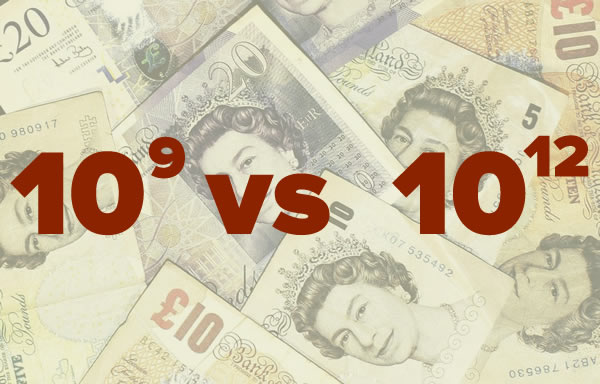
There’s a graphic about the record-breaking Powerball jackpot that’s going around the internet. Given how bad at many people are at math, I can’t tell whether it was originally intended as a joke or not. It reads:
Powerball 1.3 Billion
÷ U.S. Pop 300 Million
Everyone receives 4.33 mil
Poverty solved!
It sounds nice and inspiring, but it isn’t true. Some people will say it’s because redistribution of wealth doesn’t work and will only make things worse, and we can argue that point another time. I’m arguing that it isn’t true because the math is wrong. Here’s why:
- The Powerball jackpot is 1.3 billion dollars. A billion is 1,000 times a million, and 1.3 billion is 1,300 times a million.
- The U.S. population is slightly over 300 million, which is another way of saying 300 times a million.
- Dividing 1,300 million (the Powerball prize money) among 300 million people (the U.S. population) is exactly the same as dividing 1,300 by 300, which is the same as dividing 13 by 3: $4.33.
It won’t fix poverty, but it will buy every American a Grande-sized Starbucks drink or the Sausage McMuffin with Egg meal at McDonald’s. It’s not the American Dream; it’s more of an American snack.
Update: The “British billion” explanation

A number of people have read my article and suggested that perhaps the poster used the wrong form of “billion”, because there are two:
- The modern form, where a billion is 1,000,000,000 — written as 1 followed by 9 zeroes, and also expressed as 109 or “ten to the ninth power”.
- The archaic British form, where a billion is a million million, or 1,000,000,000,000 — written as 1 followed by 12 zeroes, and also expressed as 1012 or “ten to the twelfth power”. It’s why some people in the UK still use the form “thousand million” to refer to what we in North America call a billion.
Even if the Powerball jackpot was 1.3 British billion dollars, simple order-of-magnitude estimation shows that you won’t give everyone in the US a million bucks. Divvying that amount (on the order of 1012) among the US population (300 million, which is on the order of 108) can at most yield an amount of 104, or $10,000. If you run the actual numbers, it gives each American $4,333. That won’t lift America out of poverty, but it could give each and every American a new laptop, tablet, and smartphone.
8 replies on “The “Poverty Solved!” graphic about the Powerball $1.3 billion jackpot is wrong [Updated]”
I just figured that graphic was someone’s (successful) attempt at an epic troll. But Poe’s law being what it is, your corrective arithmetic is nevertheless a useful contribution to the whole affair.
What gets me about this is, why does this supposed revelation not immediately trigger alarm bells in everyone’s mind? Like, where do they think lottery money comes from? Do they really think that _every person in America_ has spent _$4.33 million_ on Powerball tickets since the last jackpot win? (Or more, in fact, since the lottery company takes a significant cut.)
I’m guessing the original poster was British were a Billion = a million million, as opposed to North America where a Billion = a thousand million.
Here’s how I’d look at it. There are 3.1 million teachers in the US = and let’s say 1/3 of them teach math – which is really the biggest solution to this problem. And even then dividing this gives them each only 1.3 k to teach their students how to do basic division. Probably not enough.
In my country, Spain, “un billón” means “one million millions”, like the British. It might be that the US is the exception here, more than the rule. You guys still use stones, gallons and Fahrenheit, right?
Kikito:
No, it’s the British who use stones. Stones are silly and most Americans have never even heard of it.
All Americans use both gallons and liters, and many educated ones use both Fahrenheit and Celsius.
Kikito,
No, Americans do *not*use litres or Celsius, not even the smart ones, and they definitely don’t know how to pronounce the word “kilometre”, as The Martian and Matt Damon proved. They believe their arcane medieval system of weights and measures is far superior to that newfangled metric system.
we only use liters for two-liter soda bottles. literally almost nothing else.